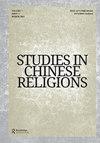Kūkai 空海 (774–835) and Saichō’s 最澄 (766–822) theories on gotra 種姓 (caste)
IF 0.3
3区 哲学
0 ASIAN STUDIES
引用次数: 0
Abstract
ABSTRACT In this article, I argue that although the Pusa yingluo benye jing 瓔珞本業經 [Sutra of the Diadem of the Primary Activities of the Bodhisattvas] utilised the theory of zhongxing 種姓 (Skt. gotra; Jp. shushō; caste) in the Pusa dichi jing 菩薩地持經 [Sutra of Stages of Bodhisattvas], the Pusa yingluo benye jing changed the explanation of zhongxing with the stages of bodhisattvas. According to Kūkai and Saichō’s interpretations of shushō related issues, the Pusa dichi jing and the Pusa yingluo benye jing were still mainstream. The theory of zhongxing in these two texts strongly influenced their thoughts on shushō.Kūkai 空海 (774–835) and Saichō’s 最澄 (766–822) theories on gotra 種姓 (caste)
摘要本文认为,虽然《普萨映罗本业经》瓔珞《菩萨原业经》采用了中兴卦论。gotra;摩根大通。嘘ō;在《普萨地学经》中,《普萨映罗本业经》用菩萨的阶段改变了对中兴的解释。根据Kūkai和赛一井对书书相关问题的解释,《普萨契契经》和《普萨映罗本业经》仍是主流。这两篇文本中的中兴学说对他们的书学思想产生了强烈的影响。
本文章由计算机程序翻译,如有差异,请以英文原文为准。
求助全文
约1分钟内获得全文
求助全文
来源期刊

Studies in Chinese Religions
Arts and Humanities-Religious Studies
CiteScore
0.20
自引率
0.00%
发文量
10
 求助内容:
求助内容: 应助结果提醒方式:
应助结果提醒方式:


